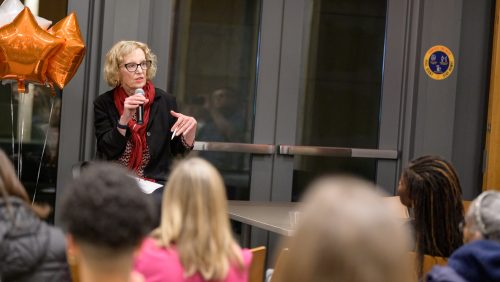On Academic Advising
Bicentennial Essay by Irene Papoulis, principal lecturer in the Allan K. Smith Center for Writing and Rhetoric, and director of Academic Advising and Faculty Development in Trinity's Center for Academic and Experiential Advising.

It happens in individual meetings, not visible to anyone beyond the confines of a professor’s office. And yet academic advising has a powerful place on the list of what makes Trinity’s liberal arts education so valuable.
I am Trinity’s Director of Academic Advising and Faculty Development, and also a faculty member in our AK Smith Center for Writing and Rhetoric. My two positions have an interesting similarity: both involve encouraging students’ self-knowledge.
In my experience, students write best, and enjoy writing most, when they write pieces that only they can write, grounded in their unique experiences as observers and thinkers. That perspective applies to my work as an adviser as well–my goal is to help students take the Trinity path that only they can take, one that grows out of, and develops, their particular and sometimes quirky interests, passions, and talents.
Advisers at Trinity know that advising well requires the ability to pay good attention to the individual student in front of us. What works for one student may not work for another, so to help students find and cultivate their own interests and strengths, we have to ask them specific questions.
That process is smoother with some students than others. Quite a few Trinity students know what they want and pursue it effectively; other students are not so sure, so advisers have to find ways to help them discover their interests and talents.
It’s a fascinating process, and Trinity professors in all departments are up to the challenge. Within majors, advisers are wonderful mentors, helping students navigate the complexities of their chosen fields.
The challenges of pre-major advising are somewhat different. For example, here are a handful of the sorts of comments pre-major advisees regularly make in advising conversations, followed by possible responses from advisers, often in the form of questions:
I want to major in this field, but I am not doing well in the course I’m taking in it.
Response: could it be that that your study habits need work? Maybe you are afraid or hesitant to ask for help from professors, teaching assistants, or classmates? What do you love about the field? Do you want to explore options for other majors?
I love studio art but I don’t want to be a starving artist.
Response: If art is your passion, one you want to work hard on, there are lucrative paths it can lead you to. But a studio arts major, like all Trinity majors, is not a vocational track—you might find a way to continue to work as an artist after college, but your Trinity degree could also lead you to a multitude of jobs in the business world and beyond that have no direct connection to art. While you’re at Trinity, you can build a portfolio for yourself, not only through your artwork, but through internships and many other experiences.
I don’t know what I am interested in, can you tell me?
Response: No, that’s one thing I can not tell you. Let’s pull up the list of majors—spend some time browsing through department websites to see what they’re all about. Which ones strikes you as intriguing, whether connected to a specific future or not? Let’s discuss classes you can take in those fields that might interest you.
I’m in my first year—I don’t know what I want to major in, but I am choosing classes to get my requirements out of the way.
Response: Really? Out of the way for what? Your answer might determine what classes you should be taking. Trinity’s curriculum has lots of room for exploration, and it’s often best to be strategic about fulfilling distribution requirements with courses that are useful in your academic path. Instead of checking off requirements, let’s talk about what you most want to study!
I’m not doing well in my classes, what do I do?
Response: Have you spoken with your professors? Students sometimes hesitate to do so, but at Trinity professors and teaching assistants are here to help you succeed. Let’s talk about how you might approach them. Do you have a study plan for yourself? How about creating one with a classmate? Let’s talk about how you might reach out to one of our academic support resources.
In our latest newsletter message to students, the Center for Academic and Experiential Advising says, “Whether you need help navigating your classes, understanding academic policy, choosing a major, or choosing a Trinity Plus experience, we are here to help you succeed.” There is so much embedded in that sentence, and we academic advisers are here for it!